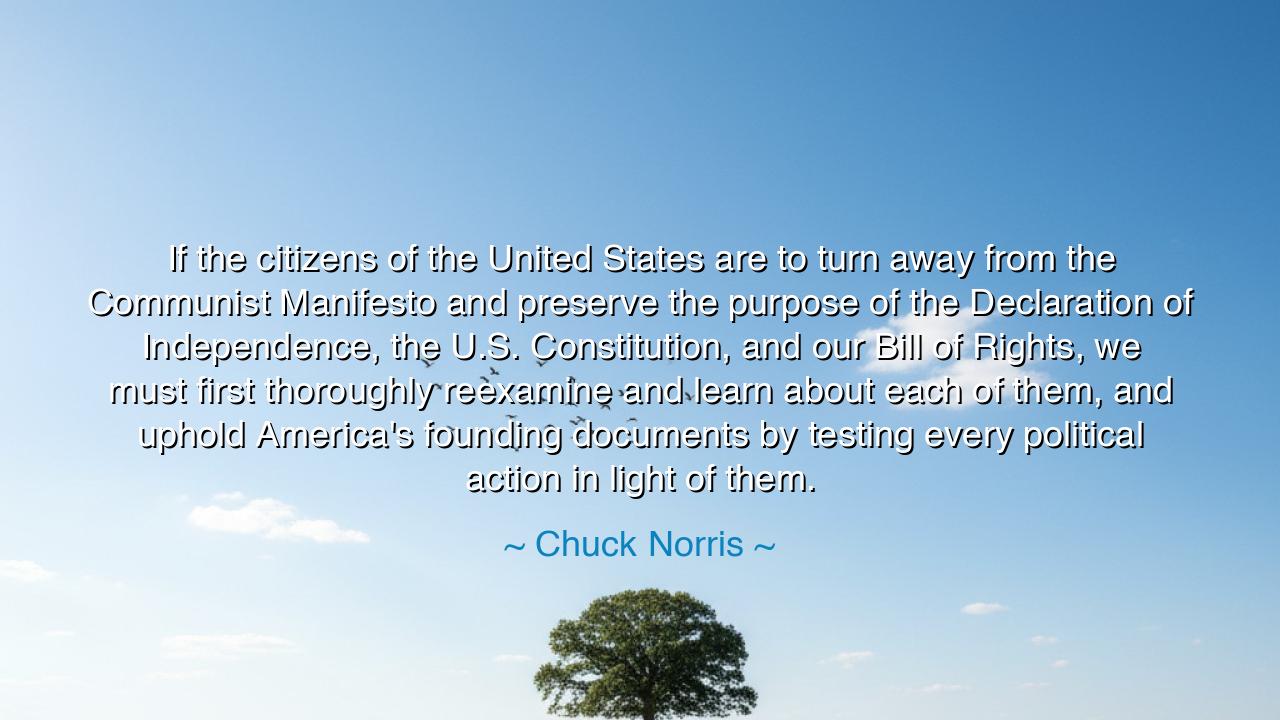
If the citizens of the United States are to turn away from the
If the citizens of the United States are to turn away from the Communist Manifesto and preserve the purpose of the Declaration of Independence, the U.S. Constitution, and our Bill of Rights, we must first thoroughly reexamine and learn about each of them, and uphold America's founding documents by testing every political action in light of them.






The words of Chuck Norris strike with the force of both patriotism and prophecy: “If the citizens of the United States are to turn away from the Communist Manifesto and preserve the purpose of the Declaration of Independence, the U.S. Constitution, and our Bill of Rights, we must first thoroughly reexamine and learn about each of them, and uphold America’s founding documents by testing every political action in light of them.” Within this declaration lies a warning and a call to action — a reminder that liberty, once taken for granted, fades not through conquest, but through forgetfulness. Norris speaks as one who understands that freedom is not inherited; it is learned, protected, and renewed by each generation that dares to value it.
The origin of these words is rooted in a time of cultural division and political uncertainty, when the meaning of America’s founding ideals seemed clouded by ideology, partisanship, and apathy. Chuck Norris, a figure often seen as a man of action, here becomes a man of reflection — urging not physical defense, but intellectual vigilance. His invocation of the Communist Manifesto is symbolic, representing not merely a political ideology, but the ever-present temptation to abandon self-reliance and individual liberty for collective comfort and control. Against this, Norris lifts up the ancient documents of American birth — the Declaration of Independence, the Constitution, and the Bill of Rights — not as relics, but as living covenants that demand constant study and allegiance.
In his call to “reexamine and learn,” Norris echoes the wisdom of every civilization that has stood on the precipice of decline. The ancients knew that a people ignorant of their laws soon become slaves to their rulers. As Cicero warned in Rome’s twilight, “Freedom is participation in power; servitude is obedience without knowledge.” The founders of the United States, likewise, built their republic not upon blood or throne, but upon understanding — the belief that the governed must know what they defend. Thus, Norris’s command is both simple and profound: if we wish to preserve freedom, we must return to the sources of its truth, to the writings that defined what it means to be a self-governing people.
History offers countless warnings to those who failed to heed such counsel. When the Roman Republic forgot the virtues that had once made it great — discipline, law, and civic duty — it gave way to emperors who ruled by decree. When revolutions in France and Russia cast aside their old orders in pursuit of equality without wisdom, they replaced tyranny with terror. In each case, the flame of liberty was extinguished not by invasion, but by internal decay — by citizens who no longer knew what freedom truly required. Norris’s message, then, is not an alarm against foreign enemies alone, but against the corrosion of national memory. For when the people forget the principles of their founding, they become easy prey to the promises of those who would rule them.
The Declaration of Independence proclaims that all men are created equal and endowed by their Creator with certain unalienable rights. The Constitution establishes the means to secure those rights through a balanced structure of government, and the Bill of Rights safeguards the individual against the overreach of authority. These are not mere historical documents — they are spiritual blueprints, drawn from centuries of human struggle against tyranny. Norris’s warning that every political action must be “tested in light of them” is a reminder that power, when unchecked by principle, corrodes both rulers and the ruled. It is only by holding each law, policy, and movement against these founding ideals that a nation remains free and righteous.
And yet, the wisdom of Norris’s words extends beyond the halls of government. They speak to the heart of every citizen who has grown weary, cynical, or complacent. Freedom is a discipline, not a gift; it must be practiced through knowledge, civic participation, and moral courage. Just as a warrior trains to defend his homeland, so must every citizen train the mind and conscience to discern truth from deception. The reading of the founding documents, the study of history, and the exercise of reason are not academic acts — they are acts of devotion, the rituals by which liberty survives from generation to generation.
Thus, let this be the lesson carried forward: a nation that forgets its founding principles loses not only its freedom, but its identity. To preserve the Declaration, the Constitution, and the Bill of Rights, we must first awaken the spirit of citizenship — that sacred duty to think, to question, and to guard against complacency. Let every man and woman take up the tools of the mind as one would take up a sword of justice, testing every new law, every movement, every promise against the enduring truth of the nation’s birthright.
For in the end, Norris’s warning is not one of fear, but of hope — a call to remember that America’s greatness does not rest in her wealth or her armies, but in the wisdom and independence of her people. To reexamine the founding documents is to rediscover who we are. And to live by their light is to ensure that the flame of freedom, once kindled in 1776, will burn undimmed for the generations yet to come.






AAdministratorAdministrator
Welcome, honored guests. Please leave a comment, we will respond soon